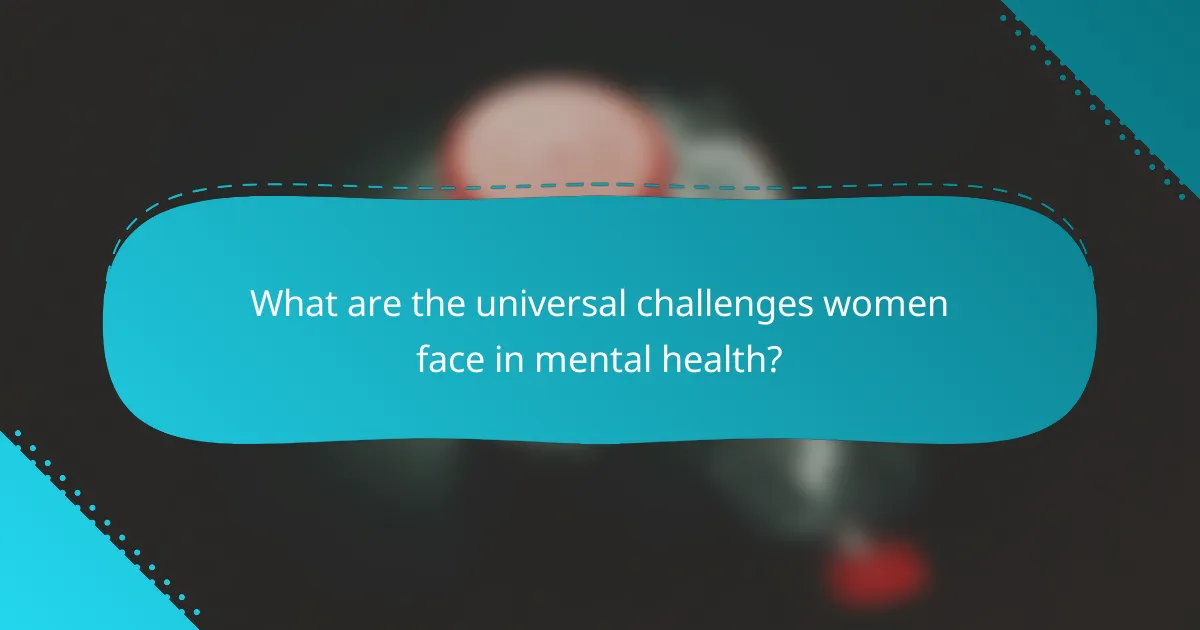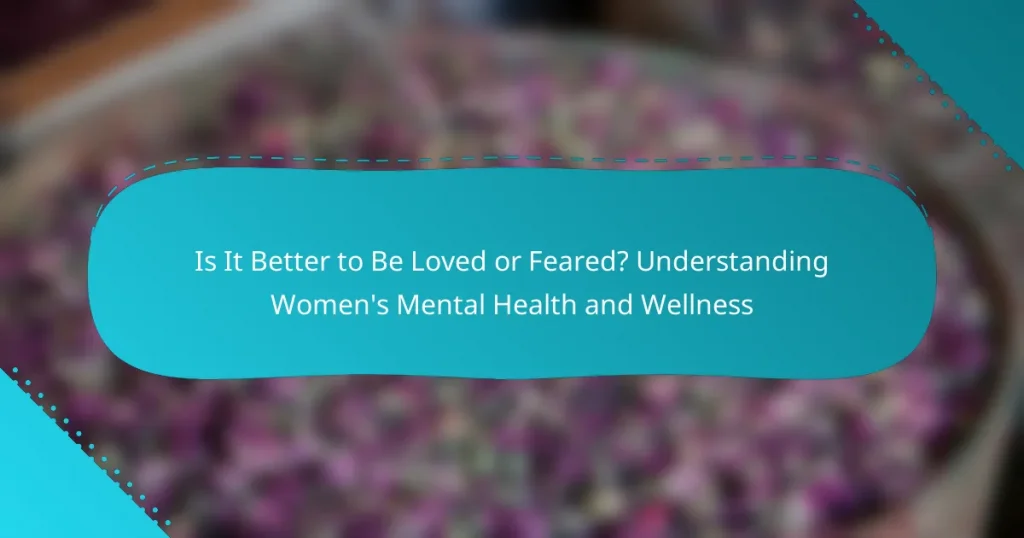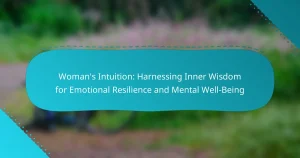Understanding whether it is better to be loved or feared is crucial for women’s mental health and wellness. Love fosters emotional security and resilience, while fear can lead to anxiety and depression. Women face unique mental health challenges, including stigma and limited access to care. By exploring the dynamics of love and fear, we can identify effective strategies for enhancing mental well-being.

What is the impact of love versus fear on women’s mental health?
Love positively impacts women’s mental health by fostering emotional security and resilience. In contrast, fear can lead to anxiety, depression, and stress-related disorders. Research indicates that supportive relationships enhance self-esteem and overall well-being, while environments of fear diminish mental health. For example, women in loving relationships report lower levels of psychological distress compared to those in fear-inducing situations. Thus, love serves as a protective factor, while fear poses significant risks to mental wellness.
How do love and fear influence emotional well-being?
Love generally promotes emotional well-being more effectively than fear. Love fosters connections, enhances self-esteem, and provides support, while fear often leads to anxiety and isolation. Research indicates that positive relationships significantly improve mental health outcomes. Fear can disrupt emotional stability, leading to stress and negative coping mechanisms. Ultimately, nurturing love contributes to resilience and overall wellness, while fear can hinder personal growth and happiness.
What psychological theories explain the balance between love and fear?
Psychological theories suggest that love fosters security and connection, while fear can motivate compliance and control. The balance between these emotions is essential for women’s mental health. Attachment theory emphasizes that secure attachments promote emotional well-being. Conversely, fear-based relationships can lead to anxiety and stress. Understanding this dynamic aids in developing healthier interactions and improving overall wellness.

What are the universal challenges women face in mental health?
Women face universal challenges in mental health, including stigma, access to care, and societal pressures. Stigma often prevents women from seeking help, leading to untreated conditions. Access to mental health resources can be limited, especially in underserved areas. Societal expectations regarding roles and behavior can exacerbate stress and anxiety. These factors contribute to a higher prevalence of depression and anxiety disorders among women compared to men. Addressing these challenges requires systemic changes in healthcare and societal attitudes.
How do societal expectations affect women’s mental wellness?
Societal expectations significantly impact women’s mental wellness, often leading to stress and anxiety. These pressures can stem from traditional gender roles, career demands, and societal beauty standards. Women may feel compelled to conform, which affects self-esteem and emotional health. As a result, mental health issues such as depression and anxiety are prevalent among women. Studies show that women are more likely to experience these conditions due to societal pressures compared to men. Addressing these expectations is crucial for improving women’s mental wellness.
What role does stress play in women’s mental health?
Stress significantly impacts women’s mental health by increasing anxiety and depression levels. It can lead to various psychological issues, including mood disorders and decreased overall well-being. Chronic stress affects hormonal balance, which can exacerbate mental health conditions. Studies indicate that women are more likely to experience stress-related disorders due to societal pressures and biological factors. Addressing stress through coping strategies is essential for improving mental health outcomes in women.

What unique experiences shape women’s mental health perceptions?
Women’s mental health perceptions are shaped by unique experiences such as societal expectations, trauma, and relationships. These factors influence how women view love and fear in their lives. Research indicates that women often prioritize emotional connections, impacting their mental wellness. For example, studies show that supportive relationships enhance resilience, while fear-based environments can lead to anxiety. Understanding these dynamics is crucial for fostering better mental health outcomes for women.
How do relationships impact women’s mental health differently?
Relationships significantly impact women’s mental health, often leading to unique emotional responses. Women may experience heightened anxiety or depression due to relational dynamics, such as emotional dependency or societal expectations. Studies indicate that supportive relationships can enhance resilience, while toxic ones can exacerbate mental health issues. For instance, women in nurturing relationships report lower stress levels and improved well-being. Conversely, those in conflictual relationships may face increased psychological distress. Understanding these nuances is crucial for promoting women’s mental wellness.
What are the unique stressors faced by women in the workplace?
Women in the workplace face unique stressors that impact their mental health and wellness. These stressors include gender bias, work-life balance challenges, and lack of representation in leadership roles. Gender bias often manifests as unequal pay and limited career advancement opportunities. Work-life balance challenges arise from societal expectations and caregiving responsibilities. Additionally, the underrepresentation of women in leadership positions can lead to feelings of isolation and limit mentorship opportunities. Addressing these stressors is crucial for improving women’s mental health and promoting workplace wellness.

What rare attributes influence women’s mental health outcomes?
Social support, trauma history, and socioeconomic status are rare attributes that significantly influence women’s mental health outcomes. These factors can shape resilience and vulnerability levels. For instance, strong social networks often correlate with lower anxiety and depression rates. Conversely, a history of trauma can exacerbate mental health issues. Socioeconomic challenges may limit access to mental health resources, impacting overall well-being. Understanding these attributes is crucial for tailoring effective mental health interventions for women.
How do cultural backgrounds affect women’s mental health perceptions?
Cultural backgrounds significantly shape women’s mental health perceptions. Different cultures influence beliefs about mental health, stigma, and coping mechanisms. For instance, collectivist cultures may prioritize family support, while individualistic societies emphasize personal responsibility. These differences affect how women seek help and perceive their mental wellness. Understanding these cultural nuances is essential for effective mental health interventions.
What is the significance of intersectionality in women’s mental wellness?
Intersectionality is crucial for understanding women’s mental wellness as it addresses how overlapping identities impact mental health. Factors such as race, class, and sexuality create unique challenges for women, influencing their experiences and access to resources. For example, women of color may face systemic barriers that exacerbate mental health issues, highlighting the need for tailored support. Recognizing these intersections allows for more effective mental health interventions and promotes holistic wellness strategies that consider individual experiences.

How can women cultivate a balance between love and fear?
Women can cultivate a balance between love and fear by prioritizing self-awareness and emotional intelligence. Understanding personal triggers allows women to navigate relationships effectively. Building healthy boundaries fosters love while mitigating fear. Engaging in open communication strengthens connections and reduces misunderstandings. Practicing self-care enhances mental wellness, enabling women to approach relationships with confidence.
What strategies promote emotional resilience in women?
Building emotional resilience in women involves strategies like fostering strong social connections, practicing mindfulness, and setting realistic goals. These approaches enhance coping mechanisms and improve mental health. Research indicates that social support significantly reduces stress and promotes well-being. Mindfulness practices, such as meditation, help women manage anxiety and enhance emotional regulation. Additionally, setting achievable goals empowers women, fostering a sense of accomplishment and control.
How can building supportive networks enhance mental health?
Building supportive networks significantly enhances mental health by providing emotional support and reducing feelings of isolation. These networks foster a sense of belonging, which is crucial for women’s mental health and wellness. Research indicates that strong social connections can lower stress levels and improve overall well-being. Additionally, engaging with supportive peers can lead to shared experiences and coping strategies, promoting resilience in challenging times.
What are effective communication techniques for expressing needs?
Effective communication techniques for expressing needs include active listening, clear articulation, and assertiveness. Active listening fosters understanding and shows respect. Clear articulation ensures your needs are conveyed without ambiguity. Assertiveness allows you to express your needs confidently while respecting others. These techniques enhance interpersonal relationships and support mental health.
What self-care practices can mitigate fear-based responses?
Self-care practices that can mitigate fear-based responses include mindfulness, physical activity, and journaling. Mindfulness techniques, such as meditation, help individuals become aware of their thoughts and feelings, reducing anxiety. Regular physical activity releases endorphins, which improve mood and decrease fear. Journaling allows for emotional expression and reflection, promoting clarity and reducing fear-related thoughts. These practices collectively enhance emotional resilience and support mental wellness.

What expert insights can guide women’s mental health practices?
Expert insights emphasize the importance of self-compassion and emotional regulation in women’s mental health practices. Prioritizing mental wellness fosters resilience and coping strategies. Research indicates that mindfulness techniques significantly improve emotional well-being. Additionally, building supportive social networks enhances feelings of belonging and reduces anxiety. Engaging in regular physical activity contributes positively to mental health outcomes.
What common mistakes should women avoid in their mental wellness journey?
Women should avoid common mistakes such as neglecting self-care, comparing their journey to others, and dismissing their feelings. These pitfalls can hinder mental wellness. Prioritizing self-compassion, seeking support, and practicing mindfulness are essential for a healthier mental health journey. Fostering a positive mindset and recognizing personal achievements can significantly enhance overall well-being.
How can women leverage professional help for better mental health?
Women can significantly improve their mental health by seeking professional help. Therapy offers tailored strategies to address unique challenges women face, such as societal pressures and work-life balance. Research indicates that women who engage in therapy report higher satisfaction and improved emotional regulation. Support groups provide a sense of community, reducing feelings of isolation. Additionally, mental health professionals can guide women in developing coping mechanisms and resilience. Prioritizing mental health through professional support is essential for overall wellness.
What are the best practices for fostering a loving environment?
Creating a loving environment emphasizes emotional safety and trust. Prioritize open communication, showing appreciation, and practicing empathy. Establishing consistent routines can enhance stability, while setting boundaries fosters respect. Engage in shared activities to strengthen connections and validate feelings to promote emotional well-being.




